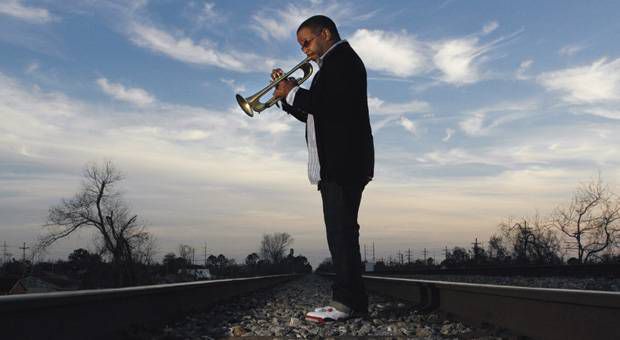Tragedy and hope
New Orleans trumpeter Terence Blanchard reflects on Hurricane Katrina
When Terence Blanchard performs his 2008 album, A Tale of God’s Will (A Requiem for Katrina), in its entirety at Koerner Hall on April 2, it will be with what he calls “a mixed stream of emotion.”
Comprised of 13 songs, the recording is a reflection of a time 11 years ago when, on August 29, 2005, the Category 3 Hurricane Katrina brutalized the Gulf Coast and New Orleans, causing floodwaters to submerge 80 per cent of the city and claiming an estimated 1,500 lives. Like many of us, the New Orleans born-and-bred jazz trumpeter was glued to his television set watching the disaster – and the unfathomable aftermath of neglect – unfold.
“We were watching it on TV because we weren’t allowed to come into the city,” Blanchard, 54, recalls. “The difference with me was that I was looking at places that I’d frequent – a city that I grew up in, streets that I walked – restaurants and grocery stores that were flooded with 10 feet of water… It was very surreal.”
When hurricane warnings prompted the evacuation of 1.2 million citizens, the musician couldn’t locate his mother, a New Orleans resident. “It was a hellacious time,” he remembers. “I couldn’t find her for two weeks. I didn’t know where she was. Then I finally found her and brought her out to L.A.”
His return to the ravaged city was chronicled in Spike Lee‘s 2006 HBO documentary, When The Levees Broke: A Requiem In Four Acts, for which Blanchard, also a noted film composer, wrote the score. The Blanchards returned to the Lower 9th Ward. The scene where his mother breaks into tears after seeing her obliterated home for the first time is heartwrenching.
A year after that project, Blanchard poured his own sadness, anger and bitterness into A Tale of God’s Will (A Requiem for Katrina) with the aid of his quintet and the Northwest Sinfonia. It would eventually earn him a Grammy for Large Jazz Ensemble Album in 2008.
He admits the prospect of resurrecting old wounds at his upcoming Toronto performance is very real. Even though he’s moved on with is life, Blanchard admits, “Frankly, it’s an emotional thing when we do perform it because it takes me back to that period of time.”
‘It was a hellacious time. I couldn’t find my mother for two weeks. I didn’t know where she was.’
Terence Blanchard Jazz musician
His feelings of frustration are easily stirred, especially concerning the lack of response from the U.S. government and the Federal Emergency Management Agency (FEMA) to the crisis. “There was a level of anger that can’t even be described, because you’re one of the most powerful countries on the planet,” he says. “And, for them not to able to react in a timely fashion when people are suffering, I thought that was an embarrassment.”
“Levees,” the first song on the album with an orchestra, is based on the story of a 73-year-old man stuck on a roof with two women, also in their 70s. “They were screaming at helicopters as they flew over for five days,” he recalls. “Think about that. In America, that happened. Crazy.”
Growing up in music-rich New Orleans didn’t inspire Blanchard to pursue any other livelihood but music, taking up trumpet at the age of eight. Jazz appealed to him for its openness.
“I grew up listening to operatic music in the house with my father, taking classical piano lessons when I was a kid,” says the former Art Blakey sideman. “Jazz just seemed to be a totally free thing. I didn’t understand the level of dedication it took to be a jazz musician at that time, but when I’d hear it playing, it was with a certain type of freedom I hadn’t heard in anything else.”
Since the 1991 release of his first recording as a solo artist, Terence Blanchard, he has released 17 albums as band leader and trumpeter, as well as scoring more than 60 movies as a film composer, including practically every Spike Lee project, beginning with Jungle Fever in 1991. Blanchard will be displaying some images from Lee’s Katrina doc during his Toronto show.
“The music was written to try to bring a universal spin on a very complex story that was in a very unique place,” he explains. “Hopefully, people will just be able to relate to that – the immense amount of pain and suffering, but also the strength and perseverance, by those very same people who struggled so much.”
Other Koerner Hall concerts this spring include: Johnny Clegg (April 9), Lizz Wright with Patricia O’Callaghan (April 22), Los Lobos (April 23), Marcus Roberts & The Modern Jazz Generation (May 14) and pianist Brad Mehldau solo (May 26). The venue will also host a performance by Anoushka Shankar (April 6), part of the 14th Annual Asian Music Series.
This content was produced by The Globe and Mail’s advertising department. The Globe’s editorial department was not involved in its creation.


/arc-anglerfish-tgam-prod-tgam.s3.amazonaws.com/public/LGGNJR2XEZH6RN4GDDUC2TCN2U)